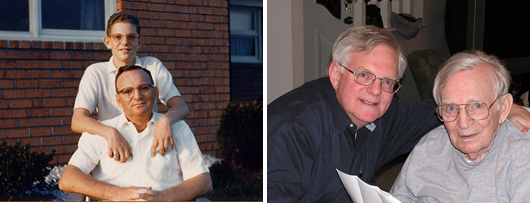|
|
Faced With Caregiving, Even Experts Struggle
By Jane Gross,
the New York Times
July 14, 2008

Dr. Jerald Winakur with his father, Len Winakur, in 1965, left, and in 2005. (Courtesy of
Dr. Jerald Winakur)
The self-help shelves at big-box book stores are sagging under the weight of how-to books for baby boomers new to the task of taking care of their frail, aging parents. These books touch all the bases: geriatric conditions, housing options, financial and legal matters, caregiver stress, government benefits, shifting family roles, national and state resources, checklists and Web sites. They are inclusive and informative, but a bit chirpy and somehow bloodless.
Sadly, the most compelling narratives on eldercare are hidden away in medical and professional journals. Excruciatingly detailed and heartfelt as only first-person accounts can be, they are written by doctors, nurses, social workers, administrators of nursing homes and the like, all of whom thought they knew everything about America’s flawed and overburdened long-term care system — until they had to navigate it and found themselves just as flummoxed as the rest of us.
Some of these accounts are available on the Web sites of the journals that published them, notably the journal Health Affairs. In a section called “Narrative Matters,” Dr. Jerald Winakur, a geriatrician at the University of Texas, wrote “What Are We Going to Do With Dad?” in 2005, and two years later “Dad’s Legacy,” about the last year of his father’s life.
“From my years as a geriatrician and now as the son of an ‘old old’ man,” Dr. Winakur wrote, “I recognize that there is but one inescapable truth: Our parents will become our children if they live long enough. . . . They will become dependent on us, our stronger arms, our acts of gentleness and caring. We will arrange for their meals, pay their bills, take them to their doctor’s visits, sit by their bedsides at the hospital and in the nursing home.”
Dr. Winakur knew better than to expect “a heaven sent coup de grace,” to hope that his father would die in his sleep, a rarity in anyone past age 80. He also acknowledged — to the reader, not his father, who died two years ago at the age of 87 — that he had dreams of ending the old man’s life with a syringe of morphine slipped into the antecubical vein.
“In this dream,” Dr. Winakur wrote, “I tell my mother and my brother that he has gone peacefully in his sleep.” I have yet to find a self-help book that is so mercilessly honest about an elderly parent’s prognosis and an adult child’s guilty wish to make the end come sooner.
“What Are We Going to Do With Dad?” is the most-read “Narrative Matters” essay ever published by the journal, its editors say. Surely, that is because many other professional journals require costly subscriptions, putting them beyond the reach of the general interest reader. Dr. Winakur’s original essay was reprinted in The Washington Post, featured on NPR and led to a contract for a book, to be published this year.
Unlike Health Affairs, The Journal of the American Medical Association offers online access to a similar department, called “A Piece of My Mind,” only to subscribers. Among the journal’s excellent essays by professionals caring for parents is “In the Here and Now” by Hedy S. Wald, a clinical psychologist at Brown University who earns her living assessing patients’ memory impairment, an irony she duly noted — “How intimately I know this thief” — when chronicling her father’s advanced Alzheimer’s disease.
“The objective and the subjective intertwined,” Dr. Wald wrote in her essay earlier this year. “The clinician-me, the family-member-me, duality grappling with the demon. Like reading all the parenting texts doesn’t guarantee being a good parent, can being a clinician, I ponder, ever really prepare you for this challenge in your own life?” Her cry from the heart could be any daughter’s: “Oh, please let me be your child again instead of a parent to you.”
From a very different perspective, Paul R. Willging, chief executive of the Assisted Living Federation of America, discovered the fallacy of aging in place only after his mother’s cascading needs could no longer be met in an assisted-living apartment.
“You’d think I’d know it all by now. But let me tell you, nothing brings the real issues of long-term care home in a more compelling fashion than confronting them personally,” he wrote in the journal Nursing Home Long Term Care Management in a 2004 essay entitled “I’ve Learned About Long-Term Care’s Reality, Thanks to Mom.”
This literature is a rich and reassuring trove for adult children who lack such professional expertise. When I stumbled upon it, during and after my caretaking years with my mother, my relief was instant. “If this is so hard for them, too, than maybe I’m handling it better than I think,” I thought. So why are these perspectives not readily available in general interest publications?
Carol Levine, director of the Families and Health Care Project at the United Hospital Fund and author of several similar essays, has some theories. “The editors (probably young) find this topic off-putting,” Ms. Levine said, referring to general interest magazines. “The women’s magazines want happy endings or at least uplifting stories of reward and inspiration. Alzheimer’s has built-in drama — mom wanders, burns the house down, doesn’t remember her favorite child — you. But diabetes? Arthritis? Heart disease? Just one more unpleasant chore after another. So instead these stories circulate in the ‘gray literature’ of special interest journals.”
What a shame.
More Information on US Health Issues
|
|



